Reminiscing
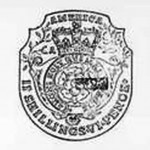 During the years that the colonies were still a part of Great Britain, it was necessary to have troops from Great Britain come and help to defend us during the French and Indian War which took place between 1754 to 1763, and Pontiac’s Rebellion from 1763 to 1764. These were quite costly wars, and to help with recuperate the losses, Great Britain enacted the Sugar Act, which while irritating to the people of the colonies, but it was hidden in the cost of import duties, and so the people accepted it. The enactment of The Stamp Act was a different story, however. The Stamp Act was a tax that Great Britain levied on just the colonies and was strongly disputed. So strongly in fact, that it led to the Revolutionary War.
During the years that the colonies were still a part of Great Britain, it was necessary to have troops from Great Britain come and help to defend us during the French and Indian War which took place between 1754 to 1763, and Pontiac’s Rebellion from 1763 to 1764. These were quite costly wars, and to help with recuperate the losses, Great Britain enacted the Sugar Act, which while irritating to the people of the colonies, but it was hidden in the cost of import duties, and so the people accepted it. The enactment of The Stamp Act was a different story, however. The Stamp Act was a tax that Great Britain levied on just the colonies and was strongly disputed. So strongly in fact, that it led to the Revolutionary War.
The Stamp Act was not what people might think it was. It was not when the use of postage stamps were first introduced. The Stamp Act went so much further than that. The Stamp Act was designed to force colonists to use special stamped paper in the printing of newspapers, pamphlets, almanacs, and playing cards, and to have a stamp embossed on all commercial and legal papers. The stamp itself displayed an image of a Tudor rose framed by the word “America” and the French phrase Honi soit qui mal y pense, meaning ”Shame to him who thinks evil of it.” Of course, the cost of said paper was high, and the colonists ere outraged. This was taxation, without representation, and it was not going to be tolerated.
Massachusetts politician Samuel Adams organized the secret Sons of Liberty organization. They planned protests against the measure, and the Virginia legislature and other colonial assemblies passed resolutions opposing the act. In October, nine colonies sent representatives to New York to attend a Stamp Act Congress, where resolutions of “rights and grievances” were framed and sent to Parliament and King George III. Their voices landed on deaf ears, and The Stamp Act was enacted on this day, November 1, 1765.
The colonists acted quickly. The arrival of the stamps to stamp the paper brought violence and economic retaliation. The colonists began a general boycott of British goods. The Sons of Liberty staged attacks on the customhouses and homes of tax collectors in Boston. The protests and economic turmoil went on for months. Finally, Benjamin Franklin appealed to the British House of Commons. Parliament took a vote, and they repealed The Stamp Act in March 1766. The same day, they made the mistake of passing Declaratory Acts, stating that the British government had free and total legislative power over the colonies.
This would prove to be their downfall. Parliament attempted to force unpopular taxation measures on the American colonies in the late 1760s. This action lead to a steady, and eventually complete, deterioration in British-American relations that brought about the outbreak of the American Revolution in 1775, and the eventual Declaration of Independence of America from Great Britain. It was a hard lesson for Great Britain to 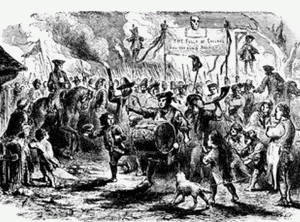 learn, and on that some political parties, namely the Democrats have not learned yet. When you tax the people too heavily, they will rebel, and the outcome will not be in the favor of that abusive government. If taxes are lower, the country will grow. Entrepreneurs will begin new ventures, and the country will prosper, and with prosperity, comes the natural process of more money to run the government. Ours is a nation of independent thinkers, and people of action. Taxes that are too high and unfair, stifle that independent thinking and slow down that action. It is just the opposite of what the proponents of a grossly obese government would expect, but it is nevertheless, the way it works. Our government would do well to realize that, and make a change.
learn, and on that some political parties, namely the Democrats have not learned yet. When you tax the people too heavily, they will rebel, and the outcome will not be in the favor of that abusive government. If taxes are lower, the country will grow. Entrepreneurs will begin new ventures, and the country will prosper, and with prosperity, comes the natural process of more money to run the government. Ours is a nation of independent thinkers, and people of action. Taxes that are too high and unfair, stifle that independent thinking and slow down that action. It is just the opposite of what the proponents of a grossly obese government would expect, but it is nevertheless, the way it works. Our government would do well to realize that, and make a change.
 In the relatively short time that our family has really reconnected with our cousins on my dad’s side, I feel very blessed to have had the opportunity to get to know my cousin Shawn Fredrick. I have to say that his personality has been such a pleasant surprise. For some reason I always thought of Shawn as really shy and serious, but now I know that he has an amazing sense of humor, and a real talent for history, especially family history. I think that part is in his blood. His grandma, my Aunt Laura Spencer Fredrick, and his great uncle, my Uncle Bill Spencer, have been studying family history for a long time…as have his Uncle Dennis Fredrick, and his dad, Gene Fredrick, both of whom are my cousins, and of course, his older brother, Tim Fredrick. I’m sure that Shawn and Tim got into the history about the same time, with their dad’s interest in it, and he was helping Uncle Bill with copies, layouts, scanning, and researching. Nevertheless, once you start looking at family history, it is very easy to become additced to it…I should know.
In the relatively short time that our family has really reconnected with our cousins on my dad’s side, I feel very blessed to have had the opportunity to get to know my cousin Shawn Fredrick. I have to say that his personality has been such a pleasant surprise. For some reason I always thought of Shawn as really shy and serious, but now I know that he has an amazing sense of humor, and a real talent for history, especially family history. I think that part is in his blood. His grandma, my Aunt Laura Spencer Fredrick, and his great uncle, my Uncle Bill Spencer, have been studying family history for a long time…as have his Uncle Dennis Fredrick, and his dad, Gene Fredrick, both of whom are my cousins, and of course, his older brother, Tim Fredrick. I’m sure that Shawn and Tim got into the history about the same time, with their dad’s interest in it, and he was helping Uncle Bill with copies, layouts, scanning, and researching. Nevertheless, once you start looking at family history, it is very easy to become additced to it…I should know.
I find, the more I get to know Shawn, that we think a lot alike…especially politically, which I love, but for the sake of my friends who disagree with me politically, I won’t go into now. Nevertheless, I think Shawn and I have a similar sense of humor too, because we also seem to find the same things funny. Shawn likes trivia, which is, in my opinion, a lot of fun too. I love to see what might have happened on a certain day in history, or even just learn about unusual facts. I think Shawn is a lot like that too, because of the things he posts on Facebook. I really like the way Shawn explains the things he is telling you about. He is very thorough, and when he is done telling you the story, you really feel like you know what was going on. Not everyone has the ability to tell a story in a way that makes you feel like you are there too.
I think both Shawn and Tim are very intelligent men, and both are very excellent computer programmers, but they both also love woodworking, which is another thing that is in their genes, through their dad, Gene, grandfather Fritz Fredrick, and great grandfather, Allen Luther Spencer, and probably other people on the Fredrick side of the family too. Their dad made beautiful dressers, desks, and cabinets, and taught them how to  make them too. Still, I’m not sure that just anyone could learn that. I believe it takes a bit of inherited talent too. I am not sure that I could make anything that would look like it was anything much, and that is one area that Shawn and I differ greatly. Of course, not all of his projects are geared toward beauty, necessarily, some like the mirror that fell, are geared toward functionality, with a little humor mixed in, as you can see from Shawn’s comment about that project. “My mirror fell in the middle of the night and shattered so in the tradition of my father for sturdy building projects that never have to be fixed again, I just installed another one with drywall anchors rated at 60 pounds. Unless we have a 7.0 earthquake, it’s not coming down again in my lifetime” No, I’m sure it won’t Shawn. Like your brother said, “When Mt. Cheyenne suddenly and unexpectedly erupts and the pyroclastic flow brings down mirrors across the city, yours will be standing!” If you can pull that off, you are a great craftsman. Seriously though, Shawn is a very talented man, and I am proud to call him my cousin.
make them too. Still, I’m not sure that just anyone could learn that. I believe it takes a bit of inherited talent too. I am not sure that I could make anything that would look like it was anything much, and that is one area that Shawn and I differ greatly. Of course, not all of his projects are geared toward beauty, necessarily, some like the mirror that fell, are geared toward functionality, with a little humor mixed in, as you can see from Shawn’s comment about that project. “My mirror fell in the middle of the night and shattered so in the tradition of my father for sturdy building projects that never have to be fixed again, I just installed another one with drywall anchors rated at 60 pounds. Unless we have a 7.0 earthquake, it’s not coming down again in my lifetime” No, I’m sure it won’t Shawn. Like your brother said, “When Mt. Cheyenne suddenly and unexpectedly erupts and the pyroclastic flow brings down mirrors across the city, yours will be standing!” If you can pull that off, you are a great craftsman. Seriously though, Shawn is a very talented man, and I am proud to call him my cousin.
 When my daughter, Amy Royce and her family first moved to the Seattle, Washington area, I started looking around online to see what sights there might be for them to go visit. The first thing I came across was the Pacific Queen shipwreck. I was excited to tell them about a shipwreck in their area. I thought it might be a cool thing to go see. Amy researched it too, and found that it was on a private beach. We were disappointed, but I couldn’t get it off my mind.
When my daughter, Amy Royce and her family first moved to the Seattle, Washington area, I started looking around online to see what sights there might be for them to go visit. The first thing I came across was the Pacific Queen shipwreck. I was excited to tell them about a shipwreck in their area. I thought it might be a cool thing to go see. Amy researched it too, and found that it was on a private beach. We were disappointed, but I couldn’t get it off my mind.
Bob and I had a little time on Saturday, so we decided to head back out to Puget Sound. I got an idea to see if there was a place where we could actually see the ship, and found that we could see it from Picnic Point Park. While we could not get close to the private beach where the Pacific Queen rests, we were treated to some really good views of the ship, 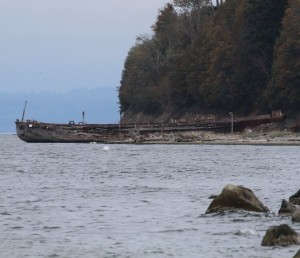 and I was so excited. This was something I really wanted to see.
and I was so excited. This was something I really wanted to see.
I started researching the origins of the Pacific Queen online, I found that she was a old minesweeper. The ship was not wrecked, but rather brought to the site by a man who planned to salvage the metal on her. So the only wreck she had was when she was run aground to her final resting place. The Pacific Queen is one of 27 boats that were brought to the sight over the years, but she is the only one that really still resembles a ship. Several of the boats are underwater except during low tide, and those still look somewhat like ships too.
I admit that I was a little disappointed that it wasn’t an actual shipwreck, but then again, the ship was built in the 1800s. It was actually brought to its current location in 1929, and really has been an area attraction since that time. The best way to get up close is by kayak, but the beach is off limits. Apparently you can walk the distance from Picnic Point Park to the Pacific Queen during the low tide, but it is not recommended that you go onto the actual beach. Nevertheless, a few people have ventured close, and if the owner was in a good mood, they might have been treated to a few of the stories surrounding the boats and their arrival at the current sight.
 In the end, with the boat viewing and my research, I felt very pleased with this adventure. Whether she had wrecked or not, the Pacific Queen was a very cool boat. It was amazing to sit and wonder where she had been and what she and her crews had seen. A minesweeper must have been an important boat, and I would think that would be a dangerous job. If you didn’t see a mine and you bumped into it…well, it was all over for you. Nevertheless, the crews of the Pacific Queen must have been good at their jobs, because she survived the war and ended up on her current resting place, a ship of beauty and intrigue, sought out by many and having her picture on the Internet for all to see. I know that for me, it was a view I will never forget.
In the end, with the boat viewing and my research, I felt very pleased with this adventure. Whether she had wrecked or not, the Pacific Queen was a very cool boat. It was amazing to sit and wonder where she had been and what she and her crews had seen. A minesweeper must have been an important boat, and I would think that would be a dangerous job. If you didn’t see a mine and you bumped into it…well, it was all over for you. Nevertheless, the crews of the Pacific Queen must have been good at their jobs, because she survived the war and ended up on her current resting place, a ship of beauty and intrigue, sought out by many and having her picture on the Internet for all to see. I know that for me, it was a view I will never forget.

 My grand niece, Hattie Joy Parmely, is celebrating a milestone today. She has arrived at her very first birthday. Her mom, Ashley Parmely tells me that Hattie Joy has lived up to her name quite well, because she is a joy for her whole family to be around. Hattie is a very busy little girl, and sometimes it’s hard for her mom to get pictures of her, because she is moving so fast. I suppose that is why she takes videos to share. And in many ways, I like to see the videos, because it shows me the true Hattie Joy personality that is quickly developing in this baby girl. Hattie is turning into a little toddler now, because she has learned to walk, and she even has three teeth now, so she is starting to love snacking too.
My grand niece, Hattie Joy Parmely, is celebrating a milestone today. She has arrived at her very first birthday. Her mom, Ashley Parmely tells me that Hattie Joy has lived up to her name quite well, because she is a joy for her whole family to be around. Hattie is a very busy little girl, and sometimes it’s hard for her mom to get pictures of her, because she is moving so fast. I suppose that is why she takes videos to share. And in many ways, I like to see the videos, because it shows me the true Hattie Joy personality that is quickly developing in this baby girl. Hattie is turning into a little toddler now, because she has learned to walk, and she even has three teeth now, so she is starting to love snacking too.
Hattie tries to be very helpful. Her dad, my nephew, Eric Parmely is always working on their house, because 
 they bought it as a fixer upper, and they are quickly turning it into their dream home. Hattie is very much on board with the projects that her mom and dad are doing, and while she may not be the greatest help to them right now, she still helps…like it or not. Of course, helping her dad build is not the only big job that little Hattie does. She makes a great motor for her big sister, Reagan’s tricycle. I suppose it’s a good thing that Reagan isn’t very heavy, but for a little one year old girl, Hattie is fully capable of giving her big sister just the push she needs…provided they don’t run into any obstacles and big sister decides to back up, because Hattie isn’t too sure of how to back up yet. Hattie also helps her mom with the earth moving projects they are doing…one rock or handful of dirt at a time. She has a little trouble with that job though. Once she gets to rocks and dirt in her mom’s hand, she knocks them back out. Some jobs just take a little bit of training.
they bought it as a fixer upper, and they are quickly turning it into their dream home. Hattie is very much on board with the projects that her mom and dad are doing, and while she may not be the greatest help to them right now, she still helps…like it or not. Of course, helping her dad build is not the only big job that little Hattie does. She makes a great motor for her big sister, Reagan’s tricycle. I suppose it’s a good thing that Reagan isn’t very heavy, but for a little one year old girl, Hattie is fully capable of giving her big sister just the push she needs…provided they don’t run into any obstacles and big sister decides to back up, because Hattie isn’t too sure of how to back up yet. Hattie also helps her mom with the earth moving projects they are doing…one rock or handful of dirt at a time. She has a little trouble with that job though. Once she gets to rocks and dirt in her mom’s hand, she knocks them back out. Some jobs just take a little bit of training.
A girl can’t spend all her time working though, and Hattie loves to dance. She is a little bit too young to go clubbing right now, so she settles for struttin’ her stuff whenever her mom puts on some music. Hattie likes dancing so much, that she has even incorporated it into one of her other favorite activities…eating. She puts some food in 
 her mouth, and then proceeds to dance it down to her tummy…all the while, sitting in her highchair. Now, not everyone can pull that one off, but Hattie does it with style…and with a smile on her little face. It would seem that our Miss Hattie Joy is a born entertainer. With everything she’s got going for her, who knows maybe she will be on Broadway someday, but I guess we will have to let her get a few years under her belt, before we will really know for sure. Today is Hattie’s 1st birthday. Happy birthday Miss Hattie Joy!! Have a great day!! We love you!!
her mouth, and then proceeds to dance it down to her tummy…all the while, sitting in her highchair. Now, not everyone can pull that one off, but Hattie does it with style…and with a smile on her little face. It would seem that our Miss Hattie Joy is a born entertainer. With everything she’s got going for her, who knows maybe she will be on Broadway someday, but I guess we will have to let her get a few years under her belt, before we will really know for sure. Today is Hattie’s 1st birthday. Happy birthday Miss Hattie Joy!! Have a great day!! We love you!!
 In a time when our police officers are being randomly attacked, I think it is important to remember just who it is that comes running in to protect those in need of assistance. Police officers have such a complicated job. Part of the people they come in contact with are in need of their assistance, and when they are, they are grateful for the help. The other part of the people are the criminal side, and they are the ones, of course, who hate the cops. And unfortunately, sometimes the lines get very blurred. There are people in need of help, but they don’t want that help, and those who the cops are arresting or giving a ticket to, who then steps in the assist the very police officer who was arresting them. Those situations are really quite surprising…amazingly so.
In a time when our police officers are being randomly attacked, I think it is important to remember just who it is that comes running in to protect those in need of assistance. Police officers have such a complicated job. Part of the people they come in contact with are in need of their assistance, and when they are, they are grateful for the help. The other part of the people are the criminal side, and they are the ones, of course, who hate the cops. And unfortunately, sometimes the lines get very blurred. There are people in need of help, but they don’t want that help, and those who the cops are arresting or giving a ticket to, who then steps in the assist the very police officer who was arresting them. Those situations are really quite surprising…amazingly so.
Nevertheless, I can see how being a police officer would be a difficult occupation. When the good guys can turn into the bad guys, and the bad guys can turn into the good guys, it creates a situation whereby an officer just doesn’t know what to expect going into any situation. Still, they go into those situations, knowing the possible perils, but knowing too that the work they do is important.
Many people don’t really give much thought to the life of a police officer, but when you have two of them in your very close family, you just naturally feel differently about them. You know their hearts and you know their level of integrity. They aren’t just a random police officer, but rather, they are family, and you love them. That is the situation in my family. We have two police officers in our midst. Leutenant Chris Hadlock, of the Casper Police Department, and State Trooper Jason Sawdon of the Wyoming Highway  Patrol, are both exceptional officers. I’m sure that is why my family and I take personal offense when someone decides that police officers are not important. There are many times when any of us could be in a really bad place, were it not for a police officer. So the next time you are stopped for speeding, and you are tempted to be angry about it, remember…you were speeding, and they officer is just doing his or her job. Any time we break the law, we are a risk for others…people, just like us, who that officer has sworn an oath to protect. Swallow that anger, and take your medicine. You deserve it. Today is a day to honor our police officers. Thank you Chris and Jason, and the officers in the Casper area and the nation. We appreciate your service. Police lives matter. Thank a police officer today.
Patrol, are both exceptional officers. I’m sure that is why my family and I take personal offense when someone decides that police officers are not important. There are many times when any of us could be in a really bad place, were it not for a police officer. So the next time you are stopped for speeding, and you are tempted to be angry about it, remember…you were speeding, and they officer is just doing his or her job. Any time we break the law, we are a risk for others…people, just like us, who that officer has sworn an oath to protect. Swallow that anger, and take your medicine. You deserve it. Today is a day to honor our police officers. Thank you Chris and Jason, and the officers in the Casper area and the nation. We appreciate your service. Police lives matter. Thank a police officer today.
 In April of 1993, my sisters, Cheryl Masterson, Alena Stevens, Allyn Hadlock, and I took a trip to the Seattle, Washington area where our sister, Caryl Reed and her family were living at the time. I had not been there before, and so was excited at the prospect. We planned to have dinner at the Space Needle, do some shopping, visit Friday Harbor, and the one I was most looking forward to, Mount Saint Helens. Since the mountain had blown up on May 18, 1980, I had been intrigued. My parents had gone there, but I was married and so didn’t go along. On that trip, because the roads there didn’t open until May, and this was April, the viewing of Mount Saint Helens was not to be, unfortunately. I was disappointed.
In April of 1993, my sisters, Cheryl Masterson, Alena Stevens, Allyn Hadlock, and I took a trip to the Seattle, Washington area where our sister, Caryl Reed and her family were living at the time. I had not been there before, and so was excited at the prospect. We planned to have dinner at the Space Needle, do some shopping, visit Friday Harbor, and the one I was most looking forward to, Mount Saint Helens. Since the mountain had blown up on May 18, 1980, I had been intrigued. My parents had gone there, but I was married and so didn’t go along. On that trip, because the roads there didn’t open until May, and this was April, the viewing of Mount Saint Helens was not to be, unfortunately. I was disappointed.
I will never forget hearing about the coming eruption in the news, on March 15, 1980. When we first heard about it, people were riveted to their televisions, but as time went on, I suspect that people got bored with it. After two months, it got to the point where we all wondered if it was just a false alarm. Then, at 8:32am Pacific Time on May 18, 1980, the mountain blew up…literally. Suddenly, everyone was riveted to the television again. It was just shocking, and since 9-11 had not happened yet, it seemed like the most shocking thing we had ever experienced…in my lifetime anyway. I remember going out to my car and finding ash all over it. I had a hard time believing that a volcano that was over a thousand miles away in Washington state, could dump ash on my 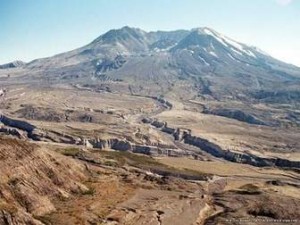 car in Casper, Wyoming. The ash went completely around the globe within a matter of days. Of course, it was nothing like what they had in the area surrounding the mountain.
car in Casper, Wyoming. The ash went completely around the globe within a matter of days. Of course, it was nothing like what they had in the area surrounding the mountain.
When my daughter, Amy Royce and her husband Travis and son, Caalab moved to the Seattle area, and then decided to renew their vows, we decided to make the trip up for the ceremony. I wanted another chance to get to see Mount Saint Helens. My first attempt was thirteen years after the eruption, and that attempt was twenty two years ago. It was time. We had a rather small window of time to go see the mountain, with everything that has been planned at Amy’s house. So, Thursday was the day. Unfortunately, we seem to have picked the worst day of the days we would be here. Nevertheless, we went in the hope of a view of the…for me anyway…elusive Mount Saint Helens. Our grandchildren, Shai and Caalab Royce went with us. They were born well after Mount Saint Helens blew, and really knew very little about it…until today, that is.
Our first stop was to the visitors center, where we looked at the exhibits displayed there and watched a really good movie that told of the events leading up to and including May 18, 1980 and beyond. After we left, I think 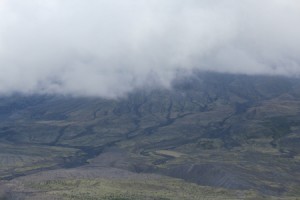 they had a much better idea about the magnitude of the whole event. We drove up to the area where we could finally view the mountain itself, only to find it sitting right there in front of us…completely shrouded in clouds and mist. We could see where the ash had landed and where the water and mud had carved out deep crevasses. We could see where erosion had taken its toll on the area, and where trees had been wiped out, and now rather small ones have grown up in their place. We could see the base of the mountain, and really, almost half way up it, but the now famous space left when the top that is no longer there blew, was still not visible to me. Sadly, I guess some things are simply not meant to be.
they had a much better idea about the magnitude of the whole event. We drove up to the area where we could finally view the mountain itself, only to find it sitting right there in front of us…completely shrouded in clouds and mist. We could see where the ash had landed and where the water and mud had carved out deep crevasses. We could see where erosion had taken its toll on the area, and where trees had been wiped out, and now rather small ones have grown up in their place. We could see the base of the mountain, and really, almost half way up it, but the now famous space left when the top that is no longer there blew, was still not visible to me. Sadly, I guess some things are simply not meant to be.
 The Constitution has been in the news a lot these days, or shall I say, the violation of the Constitution. Sometimes I wonder if the signers of the Constitution would even be able to recognize the nation that they had envisioned when they wrote the Constitution. I happen to think they would not, but then even at the signing of the Constitution there was controversy. In that way, I suppose there would always be those who would do everything in their power to change or even do away with the Constitution. At the time of the Constitutional Convention in Philadelphia, only 38 of the 41 delegates present at its conclusion, agreed to sign the document. There were those, even then, who disagreed with what was laid out there. I suppose that is common in anything in life. Needless to say, it was a hard-won battle to win the ratification by the necessary nine out of thirteen US states in existence at the time.
The Constitution has been in the news a lot these days, or shall I say, the violation of the Constitution. Sometimes I wonder if the signers of the Constitution would even be able to recognize the nation that they had envisioned when they wrote the Constitution. I happen to think they would not, but then even at the signing of the Constitution there was controversy. In that way, I suppose there would always be those who would do everything in their power to change or even do away with the Constitution. At the time of the Constitutional Convention in Philadelphia, only 38 of the 41 delegates present at its conclusion, agreed to sign the document. There were those, even then, who disagreed with what was laid out there. I suppose that is common in anything in life. Needless to say, it was a hard-won battle to win the ratification by the necessary nine out of thirteen US states in existence at the time.
Before the Constitution, the United States was operating under the Articles of Confederation, which was ratified several months before the British surrender at Yorktown in 1781. The Articles of Confederation and Perpetual Union were an agreement among all thirteen original states in the United States of America. Basically it was the first constitution. Even when not yet ratified, the Articles provided a system for the Continental Congress to direct the American Revolutionary War, conduct diplomacy with Europe, and deal with territorial issues and Native American relations, but it was weak in that it didn’t allow for our president, a court system, or taxation, thereby leaving us with a weaker government. Congress was also given no authority to enforce its requests to the states for troops, giving us a weaker military force. Yet, even with the proposed changes, there were those who would disagreed with the proposed new Constitution.
When the Constitutional Convention was convened on May 25, 1787, the plan had been to amend the Articles 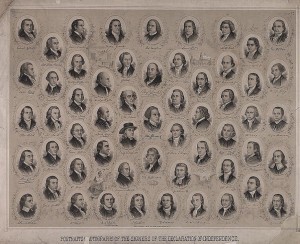 of Confederation, but that plan was quickly set aside in favor of writing a completely new Constitution. The meeting was held in Philadelphia’s Pennsylvania State House. It is now known as Independence Hall. Revolutionary War hero George Washington, a delegate from Virginia was elected as convention president. The debate was heated, but in the end, the delegates came up with a brilliant federal organization that boasted an intricate system of checks and balances. One of the main divisions in the discussions was that the more populated states wanted a state representation in Congress, and the smaller states wanted equal representation. That problem was solved by the Connecticut Compromise, which proposed a two chamber legislature with proportional representation in the lower house known as the House of Representatives and equal representation of the states in the upper house known as the Senate. It seemed a fair way to do it, but there are still those who disagree to this day.
of Confederation, but that plan was quickly set aside in favor of writing a completely new Constitution. The meeting was held in Philadelphia’s Pennsylvania State House. It is now known as Independence Hall. Revolutionary War hero George Washington, a delegate from Virginia was elected as convention president. The debate was heated, but in the end, the delegates came up with a brilliant federal organization that boasted an intricate system of checks and balances. One of the main divisions in the discussions was that the more populated states wanted a state representation in Congress, and the smaller states wanted equal representation. That problem was solved by the Connecticut Compromise, which proposed a two chamber legislature with proportional representation in the lower house known as the House of Representatives and equal representation of the states in the upper house known as the Senate. It seemed a fair way to do it, but there are still those who disagree to this day.
It would seem like they had an instant solution, but that wasn’t so. As dictated by Article VII, the document would not become binding until it was ratified by nine of the 13 states. On December 7, Delaware, Pennsylvania, New Jersey, Georgia, and Connecticut ratified the Constitution in quick succession. Other states, especially Massachusetts, opposed the Constitution, because it failed to reserve undelegated powers to the states and lacked constitutional protection of basic political rights, such as freedom of speech, religion, and the press, which I personally agree with. By February 1788, they had reached a compromise under which Massachusetts and other states would agree to ratify the document and that amendments would immediately be added to provide the protections they proposed. The Constitution was then narrowly ratified in Massachusetts. Maryland and South Carolina quickly followed. On June 21, 1788, New Hampshire became the ninth state to ratify the document, and it was agreed that government under the US Constitution would begin on March 4, 1789. In June, Virginia ratified the Constitution, followed by New York in July. The Constitution was signed on this day, September 17, 1787.
As promised, on September 25, 1789, the first Congress of the United States adopted 12 amendments to the 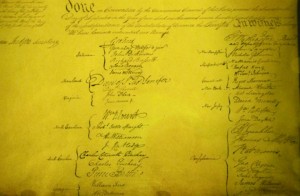 US Constitution, called the Bill of Rights. The Bill of Rights was then sent to the states for ratification. Ten of these amendments were ratified in 1791. In November 1789, North Carolina became the 12th state to ratify the US Constitution. Rhode Island, which opposed federal control of currency and was critical of compromise on the issue of slavery, resisted ratifying the Constitution until the US government threatened to sever commercial relations with the state. On May 29, 1790, Rhode Island voted by two votes to ratify the document, and the last of the original 13 colonies joined the United States. Today, the US Constitution is the oldest written constitution in operation in the world. That should say something, and it should be reason to protect it.
US Constitution, called the Bill of Rights. The Bill of Rights was then sent to the states for ratification. Ten of these amendments were ratified in 1791. In November 1789, North Carolina became the 12th state to ratify the US Constitution. Rhode Island, which opposed federal control of currency and was critical of compromise on the issue of slavery, resisted ratifying the Constitution until the US government threatened to sever commercial relations with the state. On May 29, 1790, Rhode Island voted by two votes to ratify the document, and the last of the original 13 colonies joined the United States. Today, the US Constitution is the oldest written constitution in operation in the world. That should say something, and it should be reason to protect it.

 In their first twenty years of marriage, my daughter, Amy Royce and her husband Travis lived here in Casper, Wyoming, where they raised their two children, Shai and Caalab, but Travis had always wanted to live somewhere else, and Amy was pretty tired of the harsher winters we have here. So, when their son Caalab, their youngest child, graduated from high school, they decided to make the move to a different climate…at least a little bit different one. Seattle, Washington still has the changes of season, but winter is shorter and has less snow and more rain. Amy loves the rain, you see…so much so, that it is very difficult for her to stay indoors when it rains, because all she can think of is driving in the rain. That said, they chose the Rainforest of western Washington as their location of choice to spend their next twenty years.
In their first twenty years of marriage, my daughter, Amy Royce and her husband Travis lived here in Casper, Wyoming, where they raised their two children, Shai and Caalab, but Travis had always wanted to live somewhere else, and Amy was pretty tired of the harsher winters we have here. So, when their son Caalab, their youngest child, graduated from high school, they decided to make the move to a different climate…at least a little bit different one. Seattle, Washington still has the changes of season, but winter is shorter and has less snow and more rain. Amy loves the rain, you see…so much so, that it is very difficult for her to stay indoors when it rains, because all she can think of is driving in the rain. That said, they chose the Rainforest of western Washington as their location of choice to spend their next twenty years.
Amy has been one of my very capable helpers when it came to taking care of her grandparents, but that time 
 of need is pretty much in the past now, as is their obligation as parents to get their children through school. That puts this couple is a place of few obligations, and being debt free, which sets them very free. They can make their decisions based on the fun things they want to do, and not the best place to raise their kids or the best schools to send them too…although I’m not saying that Seattle wouldn’t have fit the bill on both of those items either. Nevertheless, I am thankful that they raised their children here so I could watch them grow up and really get to know them before they moved away. Their daughter, Shai Royce decided that she didn’t want to move, and so she still lives here. Their son, Caalab made the move and will go to school there. I miss him very much.
of need is pretty much in the past now, as is their obligation as parents to get their children through school. That puts this couple is a place of few obligations, and being debt free, which sets them very free. They can make their decisions based on the fun things they want to do, and not the best place to raise their kids or the best schools to send them too…although I’m not saying that Seattle wouldn’t have fit the bill on both of those items either. Nevertheless, I am thankful that they raised their children here so I could watch them grow up and really get to know them before they moved away. Their daughter, Shai Royce decided that she didn’t want to move, and so she still lives here. Their son, Caalab made the move and will go to school there. I miss him very much.
For their twentieth anniversary, they decided to renew their vows in a ceremony on the beach…a very romantic idea. So, the plans were made and the guests invited, and today I find myself and my husband, Bob in the 
 Seattle suburb of Lynnwood, looking forward to a lovely ceremony on Saturday evening. The renewal of vows is such a deep expression of the love two people have shared for a long time, and one I highly recommend. Bob and I renewed ours at sea on a cruise we took for our twenty fifth anniversary. It was amazing, as I know their beach ceremony will be. Amy and Travis have always loved the beach…especially at sunset, which is well documented by all of her beach sunset pictures. Today is Amy and Travis’ 20th Anniversary. Happy Anniversary Amy and Travis!! We love you both very much!!
Seattle suburb of Lynnwood, looking forward to a lovely ceremony on Saturday evening. The renewal of vows is such a deep expression of the love two people have shared for a long time, and one I highly recommend. Bob and I renewed ours at sea on a cruise we took for our twenty fifth anniversary. It was amazing, as I know their beach ceremony will be. Amy and Travis have always loved the beach…especially at sunset, which is well documented by all of her beach sunset pictures. Today is Amy and Travis’ 20th Anniversary. Happy Anniversary Amy and Travis!! We love you both very much!!
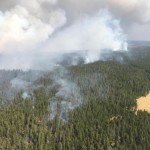
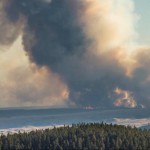 There is a fire burning in Yellowstone National Park. There are fires burning all over the western United States, as a matter of fact, but this particular fire bring back memories of the last big fire in Yellowstone National Park, and just how upset everyone was over the Let It Burn policy. Now, here we are again with a lightning caused fire burning in Yellowstone National Park, and no effort being made to fight it…unless structures end up being in danger of destruction.
There is a fire burning in Yellowstone National Park. There are fires burning all over the western United States, as a matter of fact, but this particular fire bring back memories of the last big fire in Yellowstone National Park, and just how upset everyone was over the Let It Burn policy. Now, here we are again with a lightning caused fire burning in Yellowstone National Park, and no effort being made to fight it…unless structures end up being in danger of destruction.
As with the 1988 fire, they tell us that the Natural Burn policy, another name for the Let It Burn policy, is in effect for this fire. The biggest problem with that policy is, of course, is that a fire burning unchecked can get so far out of control that it burns beyond human ability to put it out. It becomes an impossible task. That is what happened in 1988, and the whole nation was angry about it. In the end, that fire burned 1.2 million acres. Many people had the impression that the Park Service had failed badly. Nearly a third of Yellowstone National Park was badly burned. The Park Service said that the situation was inevitable because of the drought. Still, most people, me included, felt that if they had tried to fight it sooner, they could have saved a lot of the park from the hideous scarring damage it ended up with.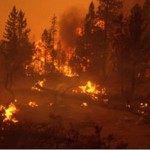

I understand that Yellowstone National Park has several fires each year, and that they usually burn themselves out in a short period of time, but in drought years, the Park Service simply can’t allow the fires to go. My concern with the current fire is that we are already at 2594 plus acres burned. How quickly is this fire going to get out of hand and how long before they will decide to do something about it?
The Yellowstone National Park fire of 1988 started in June and burned into November. It is a summer I will never forget. Our skies were constantly filled with smoke. The air stunk from the acrid smoke. It was hard for people to breathe. You couldn’t get away from it. I know this is how every person who lives in a fire area feels. I know I don’t have to explain this to anyone who has been around fires much. They already know more about wildfires than they ever wanted to.
The important thing for the government and the park service to remember is that the people of this nation love 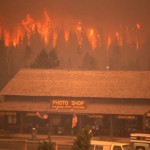
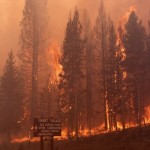 Yellowstone National Park, our oldest national park. It existed before the states where it is located were even states. I truly understand that fires are a natural part of the forest ecosystem, and that they get rid of dry brush that could bring about a worse fire, but I can’t see that it serves any good purpose to let 1.2 million acres of beautiful forest land burn and not even try to stop it. It destroys the homes of wildlife. It hurts the economy of the area it is in. All I ask is that the Park Service and the government remember just how important Yellowstone National Park is to the people of this nation.
Yellowstone National Park, our oldest national park. It existed before the states where it is located were even states. I truly understand that fires are a natural part of the forest ecosystem, and that they get rid of dry brush that could bring about a worse fire, but I can’t see that it serves any good purpose to let 1.2 million acres of beautiful forest land burn and not even try to stop it. It destroys the homes of wildlife. It hurts the economy of the area it is in. All I ask is that the Park Service and the government remember just how important Yellowstone National Park is to the people of this nation.
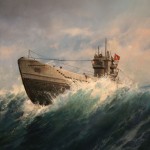 Submarines have been around a long time, but during the world wars, Germany built a submarine that was superior to any other submarine of the time. Called the U-Boat, the name was short for Unterseeboot, or under sea boat. Winston Churchill said, “the only thing that ever really frightened me during the war was the U-boat peril.” Churchill identified the threat that the U-Boats posed. The Atlantic Lifeline was vital to Britain’s survival. If Germany had been able to prevent merchant ships from carrying food, raw materials, troops and their equipment from North America to Britain, the outcome of World War II could have been very different. Britain might have been starved into submission, and her armies would not have been equipped with American built tanks and vehicles. The U-Boats were a serious threat. The Battle of the Atlantic was a must win situation. If Germany won that battle, Britain would likely have lost the war.
Submarines have been around a long time, but during the world wars, Germany built a submarine that was superior to any other submarine of the time. Called the U-Boat, the name was short for Unterseeboot, or under sea boat. Winston Churchill said, “the only thing that ever really frightened me during the war was the U-boat peril.” Churchill identified the threat that the U-Boats posed. The Atlantic Lifeline was vital to Britain’s survival. If Germany had been able to prevent merchant ships from carrying food, raw materials, troops and their equipment from North America to Britain, the outcome of World War II could have been very different. Britain might have been starved into submission, and her armies would not have been equipped with American built tanks and vehicles. The U-Boats were a serious threat. The Battle of the Atlantic was a must win situation. If Germany won that battle, Britain would likely have lost the war.
From 1918 on, Germany was not supposed to have submarines or submarine crews. However, no checks were in place to stop any research into submarines in Germany and it became clear that during the 1930’s, Germany had been investing time and men into submarine research. Their research and subsequent development of the U-Boat made it a submarine that was very difficult to locate and that made it extremely dangerous. They developed the Enigma machine, which was a series of electro-mechanical rotor cipher machines developed and  used in the early to early-mid twentieth century for commercial and military usage. Enigma was invented by the German engineer Arthur Scherbius at the end of World War I. The codes it could provide were difficult to decipher. German military messages enciphered on the Enigma machine were first broken by the Polish Cipher Bureau, in December 1932. This success was a result of efforts by three Polish cryptologists, Marian Rejewski, Jerzy Rózycki and Henryk Zygalski, working for Polish military intelligence. Rejewski reverse-engineered the device, using theoretical mathematics and material supplied by French military intelligence. Then, the three mathematicians designed mechanical devices for breaking Enigma ciphers, including the cryptologic bomb. In 1938, the Germans made the machine more complex, and increased complexity was repeatedly added to the Enigma machines, making decryption more difficult and requiring further equipment and personnel. It was more than the Poles could readily produce.
used in the early to early-mid twentieth century for commercial and military usage. Enigma was invented by the German engineer Arthur Scherbius at the end of World War I. The codes it could provide were difficult to decipher. German military messages enciphered on the Enigma machine were first broken by the Polish Cipher Bureau, in December 1932. This success was a result of efforts by three Polish cryptologists, Marian Rejewski, Jerzy Rózycki and Henryk Zygalski, working for Polish military intelligence. Rejewski reverse-engineered the device, using theoretical mathematics and material supplied by French military intelligence. Then, the three mathematicians designed mechanical devices for breaking Enigma ciphers, including the cryptologic bomb. In 1938, the Germans made the machine more complex, and increased complexity was repeatedly added to the Enigma machines, making decryption more difficult and requiring further equipment and personnel. It was more than the Poles could readily produce.
Finally there was a breakthrough. The astonishing achievements of the codebreakers of Bletchley Park saved countless lives. At their peak, there were 12,000 codebreakers at Bletchley Park, 8,000 of them women. The codebreakers helped bring victory in North Africa by giving British commander General Montgomery details of 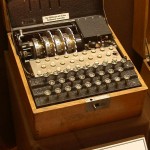 Erwin Rommel’s battle plans and providing the routes of the Nazi supply convoys. This allowed the Royal Navy the opportunity to sink them. Prior to the codebreakers, the U-Boats were only sunk after damage or near damage was done to other ships. Such was the case with the first sinking of a U-Boat. German submarine U-39 was a Type IXA U-boat of the Kriegsmarine that operated from 1938 to the first few days of World War II. On 14 September 1939, just 27 days after she began her first patrol, U-39 attempted to sink the British aircraft carrier HMS Ark Royal by firing two torpedoes at her. The torpedoes malfunctioned and exploded just short of the carrier. In retaliation, U-39 was immediately hunted down by three British destroyers. She was disabled with depth charges, and subsequently sunk. All crew members survived and were captured.
Erwin Rommel’s battle plans and providing the routes of the Nazi supply convoys. This allowed the Royal Navy the opportunity to sink them. Prior to the codebreakers, the U-Boats were only sunk after damage or near damage was done to other ships. Such was the case with the first sinking of a U-Boat. German submarine U-39 was a Type IXA U-boat of the Kriegsmarine that operated from 1938 to the first few days of World War II. On 14 September 1939, just 27 days after she began her first patrol, U-39 attempted to sink the British aircraft carrier HMS Ark Royal by firing two torpedoes at her. The torpedoes malfunctioned and exploded just short of the carrier. In retaliation, U-39 was immediately hunted down by three British destroyers. She was disabled with depth charges, and subsequently sunk. All crew members survived and were captured.

